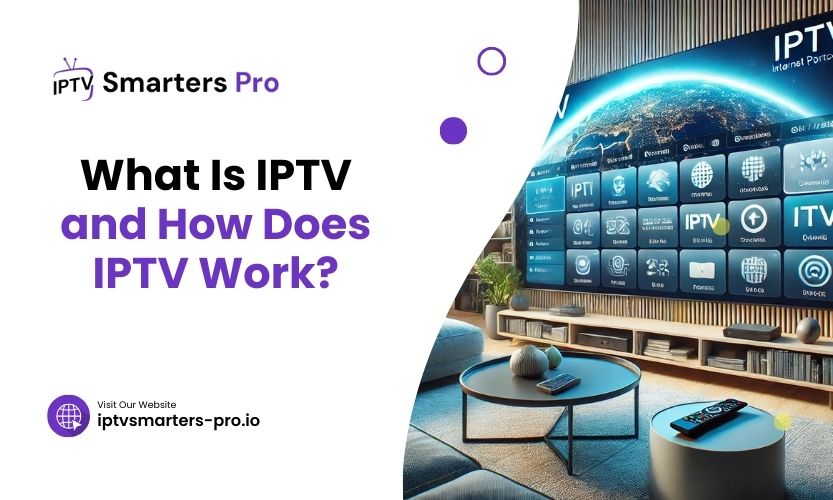If you’ve ever wondered how to watch TV shows, live sports, or movies without relying on traditional cable or satellite providers, IPTV might be the solution you’ve been seeking. It’s a growing trend transforming how content is delivered and consumed. But what is IPTV, and how does IPTV work? This article will give you a complete understanding of the topic, broken down into simple terms.
What Is IPTV and How Does IPTV Work?
IPTV stands for Internet Protocol Television. It’s a modern way of delivering television content over the internet rather than through traditional methods like cable or satellite. Instead of relying on coaxial cables or broadcast signals, IPTV uses internet connections to stream media directly to your device.
But what sets IPTV apart? Unlike traditional TV, which broadcasts shows in real-time, IPTV allows for flexibility. You can watch your favorite content live, on-demand, or even save it for later. It caters to the viewer’s needs, giving you control over what, when, and how you watch.
How Does IPTV Work?
To understand how IPTV works, let’s break it down step by step:
- Content Acquisition
IPTV providers first acquire content from television networks, production houses, or streaming platforms. This content could be live TV, movies, or recorded shows. - Encoding and Compression
The acquired content is then converted into digital signals. It’s compressed to ensure it can be streamed over the internet without taking up excessive bandwidth. - Content Distribution
Once the content is ready, it’s stored on servers and distributed to viewers via the Internet. The viewer’s device—a smart TV, mobile phone, or set-top box—fetches the content from these servers. - Streaming to Devices
When you select a program, the content streams to your device in small data packets. These packets ensure smooth playback, even with minor network fluctuations. - Interactivity and Control
IPTV gives users control over the viewing experience. You can pause, rewind, or fast-forward live TV and access on-demand content whenever you like.
Types of IPTV Services
There are three main types of IPTV services, each catering to different viewer preferences.
| Type | Description |
| Live IPTV | Streams live TV channels over the internet in real time. |
| Video on Demand | Allows users to choose and watch specific movies or shows from a library. |
| Time-Shifted Media | Enables users to watch previously aired programs at their convenience. |
Live IPTV is ideal for sports fans who want to catch the game as it happens. Video on demand is perfect for movie lovers wishing to have a wide selection of titles. Time-shifted media is an excellent solution for those who missed their favorite shows but still want to catch up.
Why Is IPTV Gaining Popularity?
Traditional cable TV often comes with rigid schedules and limited options. IPTV, on the other hand, offers flexibility, variety, and convenience. Let’s dive into some reasons why IPTV is the future of television.
- On-Demand Viewing
With IPTV, you no longer need to wait for your favorite show to air. Access the content you want when you want it. - Global Access
IPTV makes it possible to watch channels and shows from different countries. All you need is an internet connection. - Cost-Effective
Many IPTV services offer affordable packages compared to traditional cable subscriptions. - Compatible Devices
Whether using a smartphone, smart TV, or tablet, IPTV works across multiple devices. - Interactive Features
Features like pausing live TV, creating playlists, and saving shows add to its appeal.
What Do You Need to Use IPTV?
To get started with IPTV, here’s what you’ll require:
- Reliable Internet Connection
A stable internet connection with sufficient speed is crucial for smooth streaming. Ideally, you should have at least 10 Mbps for HD content. - IPTV Subscription
Choose a reliable IPTV provider that offers a package that suits your preferences. - Compatible Device
IPTV can be accessed on smart TVs, smartphones, tablets, computers, and dedicated IPTV boxes. - IPTV App
Download an IPTV app, like TiviMate or IPTV Smarters, to access and manage your IPTV subscription.
Benefits and Challenges of IPTV
No service is perfect, and IPTV is no exception. Understanding its pros and cons will help you decide if it’s the right fit for you.
| Benefits | Challenges |
| Wide content variety | Requires a reliable internet connection |
| Flexible viewing options | Risk of legal issues with some unverified IPTV providers |
| Affordable compared to cable | Quality can vary based on the provider |
| Accessible across devices | Limited support for troubleshooting from certain services |
How Secure Is IPTV?
One question that often comes up is about IPTV security. Legitimate IPTV services are safe to use. However, some unofficial providers may operate in legal gray areas. Always ensure your provider is licensed and complies with local broadcasting laws.
FAQs
- What is IPTV, and how does IPTV work?
IPTV is a method of delivering TV content over the internet. It works by streaming compressed digital signals to your device via data packets. - Can I watch IPTV on any device?
Yes, IPTV can be accessed on smart TVs, phones, tablets, and dedicated IPTV boxes. - Do I need a special internet connection for IPTV?
While no special connection is required, a stable internet speed of at least 10 Mbps is recommended for HD content. - Is IPTV legal?
IPTV is legal if your provider has the necessary licenses to distribute content. - Why is my IPTV buffering?
Buffering can occur due to slow internet speeds, server issues, or low-quality service from your provider.
Final Thought
IPTV has revolutionized the way we consume television content. By offering flexibility, affordability, and a wide range of options, it has become a popular choice for viewers worldwide. If you’re tired of traditional cable and want a service tailored to your needs, IPTV might be what you’ve been waiting for.


